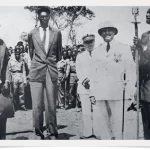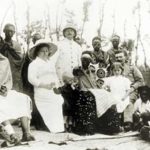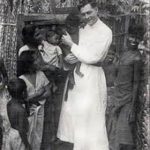The Missionaries as Mediators to Court Confrontation
As Musinga consolidated his hold on power, the threatened notables sought to protect themselves by improving their own relations with the missionaries. The Fathers suddenly found notables were willing to provide men and materials for their construction projects, and were eager to visit the mission, or to send their bagaragu (clients) or their ntore (young warriors in training at their residences) to pay their respects for them. Kabare took the lead in this movement. Although he did not deign to visit the Fathers personally, his ntore came to the Kabgayi mission nearly every day. By September 1907 so many notables were visiting Kabgayi that the missionaries sent the least important of them away without the long conversation that Rwandans held to be the essence of courtesy. In an astonishing contrast to the lamentations of even six months before about the aloofness of the notables, the Fathers now complained that the flood of Tutsi visiting them was interfering with the daily work of the station.
Even when relations between Musinga and the Fathers had deteriorated in 1906, the mwami had sought to retain some tie with the missionaries; so later, when relations improved, he did not abandon his vigilance toward them. As one of the Fathers remarked perceptively, Musinga’s installation of Kabare and Rwidegembya next to their school at Nyanza was meant to control the missionaries as well as the notables.
As he had done earlier, Musinga from time to time delayed providing promised men or materials to remind the Fathers that his cooperation was essential to getting what they needed. And as before, he turned to Kandt and von Grawert when he felt the missionaries were interfering with the exercise of his power.
In July 1907 there arrived a new group of Europeans, Protestants of the Bethel-bei-Bielefeld Mission, who offered Musinga yet another prospect for balancing the power of the Fathers. When the leader of the mission, Pastor Ernst Johanssen, first visited Nyanza to request land for a station, Musinga inquired carefully into the differences between his group and the Catholics. Most importantly, he wished to know if the Protestants would try to expel the Catholics.Through contacts with Christian traders from Buganda, to the northeast of Rwanda, Musinga must have known about the grave conflicts engendered in their kingdom by differences between Protestants and Catholics. Seeing the utility of encouraging competition among the missionaries, Musinga refused the sites proposed by the Protestants and instead granted them land near the Zaza station. When the Protestants requested a second post the next month, Musinga did his best to place them near Save, but he finally allowed them to settle at Kirinda, a day’s travel northwest of Nyanza.
In 1907 Musinga was eager for good relations with the Fathers too because he hoped they would shield him from possible dangers arising from the planned visit of the Duke of Mecklenburg, a member of the German royal family who was to come to Rwanda in August. Musinga and the Bega feared that every powerful European who visited the Court might end their illegitimate reign and place a new heir on the throne. Because Mecklenburg came with an impressive expedition of more than six hundred soldiers and porters, and because von Grawert exaggerated the nobleman’s importance to ensure his warm welcome, his visit sparked especially great fear at Nyanza. Rumors multiplied: some said the duke was himself a personification of the lost Biregeya; others said he was bringing the prince with him to install on the throne. Throughout the kingdom the usual conversation and visits among notables gave way to collecting hundreds of pounds of food and hundreds of goats and fine cattle for Musinga to present to the nobleman. Musinga summoned all his major bagaragu and their clients to Court, threatening to recall his cattle from any who did not come. Between six and eight thousand notables gathered at Nyanza to protect their mwami, who some believed would be taken captive by the powerful German. Kanjogera supposedly fled Nyanza, while Kabare appeared only once briefly during the duke’s visit.
Tension reached a peak when Musinga presented his gifts to the duke; the procession of bearers took almost an hour. In the Rwandan context of clientship, where acceptance of gifts by a shebuja indicated approval of his client, the duke’s acceptance of Musinga’s tribute would mean his continued support for the mwami. However, even after Musinga’s gifts had been accepted, he could not relax: he was said to find it impossible to sleep while there was a single European in his capital, and now he found himself surrounded by ten of them with all their accompanying soldiers and servants. The only incident that marred the visit was an attack on one of the duke’s messengers who was following the expedition to Court. When the mwami learned of the incident, he condemned to death the accused assailant, a mugaragu of one of his most favored notables.
The strain of dealing with the Europeans and their implicit threat to the rule of Musinga and the Bega produced a sharp reaction at Court in the weeks following the visit. Musinga, said to be disgusted by the smell of so many Europeans and so many European things, ordered bags of toilet soap given him by the Germans removed from his storehouse and thrown in a nearby swamp. He wanted only to be left in peace to recover his composure. The notables too responded to the passing of the danger. Some talked of how the Europeans had not dared harm their ruler, while others released their repressed resentment on followers of the missionaries. A member of the expedition, the ethnographer Jan Czekanowski, who had remained at Court todo research, received no cooperation from the mwami or the notables. Despite his persistent inquiries, they refused to recount to him the history of the kingdom. Perhaps because they were appalled by Czekanowski’s careful attention to the bones of victims of Court executions, which lay unburied in a cave near Nyanza, they refused to allow themselves to be measured for his charts.
Six weeks after the duke had left, a messenger of the Protestants stole some goods and insulted one of Musinga’s bagaragu while en route to Court. Musinga restrained his anger long enough to inform the Protestants of their man’s misdoings. When the Protestants sent back word that Musinga should punish the accused, the mwami and his notables gave vent to the anger that lay below their polite exterior in dealing with the foreign interlopers. First Musinga, then the notables, beat the man until they were exhausted. Rwidegembya and Kayondo, another Mwega just coming into prominence, punished the accused most harshly. As the notables beat the man, they expressed the idea that attacking the client of a strong man serves the same purpose as attacking the patron himself: “It is a European whom we are beating,” theysaid. Musinga supposedly declared that he had had to execute one of his men who had robbed the duke’s messenger, and now he would kill one of the Europeans’ men who had dared to injure his client. He hoped thus to regain the respect of those who had been mocking him, saying that he was afraid of the Europeans and that he was their man. After the accused had been executed, the spirits of the notables soared. Some pointed out the cadaver to a Father and told him that the mwami would do the same to him if he did not obey.
Having somewhat reestablished the balance with the Europeans through this execution and having gradually won power from Kabare, Musinga ended 1907 as mugabo ukomeye, a strong and mature adult.From this time on, Kabare’s importance declined slowly but steadily. Aware of Kanjogera’s attachment to this brother, the mwami never dared oust him completely from Court, but he did manage to limit him to the role of elder statesman. Although only middle-aged, Kabare was frequently ill and could devote less attention to public affairs. Kanjogera, anxious for him to preserve his health, nagged him regularly about drinking too much, but his condition continued to worsen. In 1909 he left Court voluntarily for the first time since the coup and spent months resting at his residence at Gisanze, near the Save mission.
Seeking to strengthen his ties with the Fathers, Kabare called two Christians to Gisanze and asked them to represent him at Save. During the conversation, Kabare offered beer to the converts, thus breaking the resolve he and many other Tutsi had maintained of not sharing a drinking straw with the inyangarwanda, the “repudiators of Rwanda.” When later questioned by a nephew about why he had done so, Kabare reminded the young man that his own father had been among the first to drink with a Twa who had been ennobled by Rwabugiri. Clearly, a pariah who had assumed great power was by definition no longer a pariah.Throughout the next two years, Kabare maintained friendly relations with the Fathers, giving them cattle and even visiting their church. Musinga meanwhile countered his advances to the missionaries with his own gifts.
The conflict between the young ruler and his once all-powerful uncle never openly exploded. Kabare grew steadily weaker until his death in March 1911. By this time Musinga was firmly in command. Those influential at Court, including Rwidegembya and Kayondo, were then exerting their power through the mwami, not in opposition to him. But if Musinga had triumphed over the Bega men, he had not freed himself of the Mwega woman. On several occasions rumors spread thatthe mwami was seeking a site for a new residence and would return to the pattern of shifting capitals followed by earlier bami. Such a system would have permitted him to assign a residence to Kanjogera and to live separately from her.But none of the attempts at relocation ever brought results. When Kabare died, Kanjogera became persuaded that Musinga’s half-brother, Cyitatire, had poisoned him. So powerful was she that the mwami had to advise Cyitatire to leave Nyanza until Kanjogera’s desire for vengeance subsided; he could not guarantee the safety of even a member of his own father’s lineage against his mother’s wrath.
https://uk.amateka.net/the-missionaries-as-mediators-to-court-confrontation/https://uk.amateka.net/wp-content/uploads/2022/11/amateka-idini.jpghttps://uk.amateka.net/wp-content/uploads/2022/11/amateka-idini-150x150.jpgChurch and RevolutionMissionary historyAs Musinga consolidated his hold on power, the threatened notables sought to protect themselves by improving their own relations with the missionaries. The Fathers suddenly found notables were willing to provide men and materials for their construction projects, and were eager to visit the mission, or to send their...BarataBarata rpierre@ikaze.netAdministratorAMATEKA | HISTORY OF RWANDA



